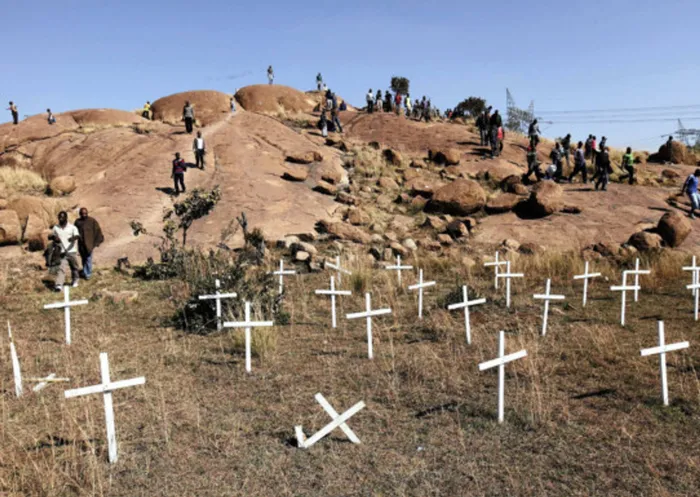
The Marikana commission of inquiry failed to deliver justice for victims, says the Socio - Economic Rights Institute
Image: File
TODAY marks 13 years since the Marikana massacre took place near Rustenburg, North West.. Justice remains out of reach. No prosecutions have been issued for the mineworkers who were killed on the 16th of August 2012. Neither has anyone been held to account for the physical and psychological injuries suffered by many more.
Without bringing prosecutions for the massacre, the state continues to fail the families of the deceased and the survivors of the massacre. Forty-four people were killed between August 12 and 16, including 34 mineworkers who were massacred by the police on August 16.
According to the Farlam Commission of Inquiry report, police fired over 300 rounds of live ammunition over an eight to twelve second period at ‘scene 1’ where 16 mineworkers died. Police then pursued the fleeing mineworkers into the surrounding rocky area and killed another 17 at ‘scene 2’ having fired 295 rounds of ammunition.
Fourteen of the 17 died on the scene. Although police were found to have tampered with the crime scene, at least 10 of those killed at scene 2 appeared to be seeking refuge while others found appeared to have been killed while fleeing.
The report details how, despite being present, paramedics were not allowed to administer care to the mineworkers at scene 1 for about an hour and medical attention to scene 2 was also delayed.
In addition to the deaths, at least another 78 of the miners were severely injured and approximately 250 arrested. Despite repeated assurances of its commitment to dealing with the criminal proceedings relating to the deaths at Marikana, the National Prosecuting Authority (NPA) has failed to prosecute anyone for the deaths of mineworkers arising from the events of 16 August 2012.
To date, the NPA has only prosecuted nine police officers, some in relation to the events of 13 August 2012 and others concerning the circumstances surrounding of one of the deaths from the massacre.
In 2021, former North West Deputy Police Commissioner Major-General Mpembe, along with officers Gideon van Zyl, Dingaan Madoda and Oupa Pule were acquitted in the matter relating to the death of Modisaotsile van Wyk Sagalala, one of the 34 mineworkers shot at ‘scene 2’ on 16 August 2012 who died while handcuffed at the back of a police truck.
The South African Police Service had testified at the Marikana Commission of Inquiry that Sagalala died at the Andrew Saffie hospital instead.
In a separate case that was concluded in September 2024, the High Court acquitted six officers (Mpembe, retired Colonel Salmon Johannes Vermaak and officers Nkosana Mguye, Masilo Mogale, Katlego Joseph Sekgweleya, and Khazamola Phillip Makhubela), for their role in the events of 13 August 2012.
These events resulted in the deaths of three mineworker Semi Jokanisi, Thembelakhe Mati and Pumzile Sokanyile as well as two police officers Warrant Officer Tsietsi Hendrik Monene, and Warrant Officer Sello Ronnie Lepaauku.
The two trials that concluded in 2021 and 2024 sat sporadically and were slow-moving. They have been the closest that the families have come to learning the true details about the deaths of their loved ones and obtaining some form of closure.
Both failed prosecutions have shown the corrosive impact that the passage of time has had on the strength of the state’s cases, which means that further delays in prosecutions is to deny the families justice and an opportunity to see those implicated being held to account.
In 2023, the NPA issued a statement detailing various personnel and resource constraints as reasons for their failure to prosecute the Marikana case. However, two more years have passed, and the families and survivors of the massacre have still not seen any progress concerning prosecutions for the massacre of 16 August 2012.
Following the acquittals in 2024, the families were told that the NPA would consider an appeal but have heard nothing since. This inaction reflects a lack of commitment to ensuring the families obtain justice for the deaths of their loved ones.
Over the years several family members have died before seeing any meaningful form of accountability. Aside from justice for the families, prosecutions for the massacre are consistent with South Africa’s international obligations concerning victims of gross human rights violations, of which the Marikana massacre is emblematic.
According to the United Nation’s Basic Principles and Guidelines on the Right to a Remedy adopted by the General Assembly in 2005, the South African government has an obligation to:
SERI executive director, Nomzamo Zondo, has said that: “The failure to hold accountable those responsible for these deaths is a betrayal of the promise of justice. Not only does it dishonour the families of the deceased but erodes trust in our justice system."
Marikana has arguably been the most politicised incident of police brutality since 1994. It has left permanent scars on our democracy. SERI continues to mourn the deaths of those killed at Marikana in 2012. The families have sought accountability for the deaths of their loved ones for the past 13 years.
We urge the NPA to finally demonstrate its commitment to justice by issuing prosecutions for the deaths at Marikana without fear, favour or prejudice. As a country that abides by the rule of law, it is crucial that justice is administered equally and that the families and survivors of the massacre are given the opportunity to obtain closure.
Related Topics: